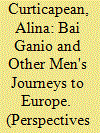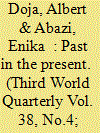| Srl | Item |
| 1 |
ID:
082259


|
|
|
|
|
| Publication |
2008.
|
| Summary/Abstract |
This article examines the role of Balkanism in Bulgarian EU accession discourses
during the period that preceded the country's membership of the EU. It focuses on political
cartoons ? regarded as indicative of broader societal discourses ? which activate the 'journey'
or 'motion' metaphor that dominated the imagery of EU integration. The article was
prompted by a perceived incongruity in the study of the discursive encounter between the
West and the Balkans. While most analysis concentrates on the Western or European self, by
examining EU accession discourses in Bulgaria, this article turns to the Balkans' responses to
Western constructions. The study brings to light a decidedly mixed picture. Even though the
crucial role of Balkanist representations and interpretations in Bulgarian EU accession
discourses cannot be denied, alternative constructions are certainly present. They range
from ambiguity and indifference to more overt challenges to the binary oppositions that
characterize Balkanism.
|
|
|
|
|
|
|
|
|
|
|
|
|
|
|
|
| 2 |
ID:
152089


|
|
|
|
|
| Summary/Abstract |
In this article, we explore various forms of travel writing, media reporting, diplomatic record, policy-making, truth claims and expert accounts in which different narrative perspectives on the Balkan wars, both old (1912–1913) and new (1991–1999), have been most evident. We argue that the ways in which these perspectives are rooted in different temporalities and historicisations and have resulted in the construction of commonplace and time-worn representations. In practical terms, we take issue with several patterns of narratives that have led to the sensationalism of media industry and the essentialisation of collective memory. Taken together as a common feature of contemporary policy and analysis in the dominant international opinion, politics and scholarship, these narrative patterns show that historical knowledge is conveyed in ways that make present and represent the accounts of another past, and the ways in which beliefs collectively held by actors in international society are constructed as media events and public hegemonic representations. The aim is to show how certain moments of rupture are historicised, and subsequently used and misused to construct an anachronistic representation of Southeast Europe.
|
|
|
|
|
|
|
|
|
|
|
|
|
|
|
|